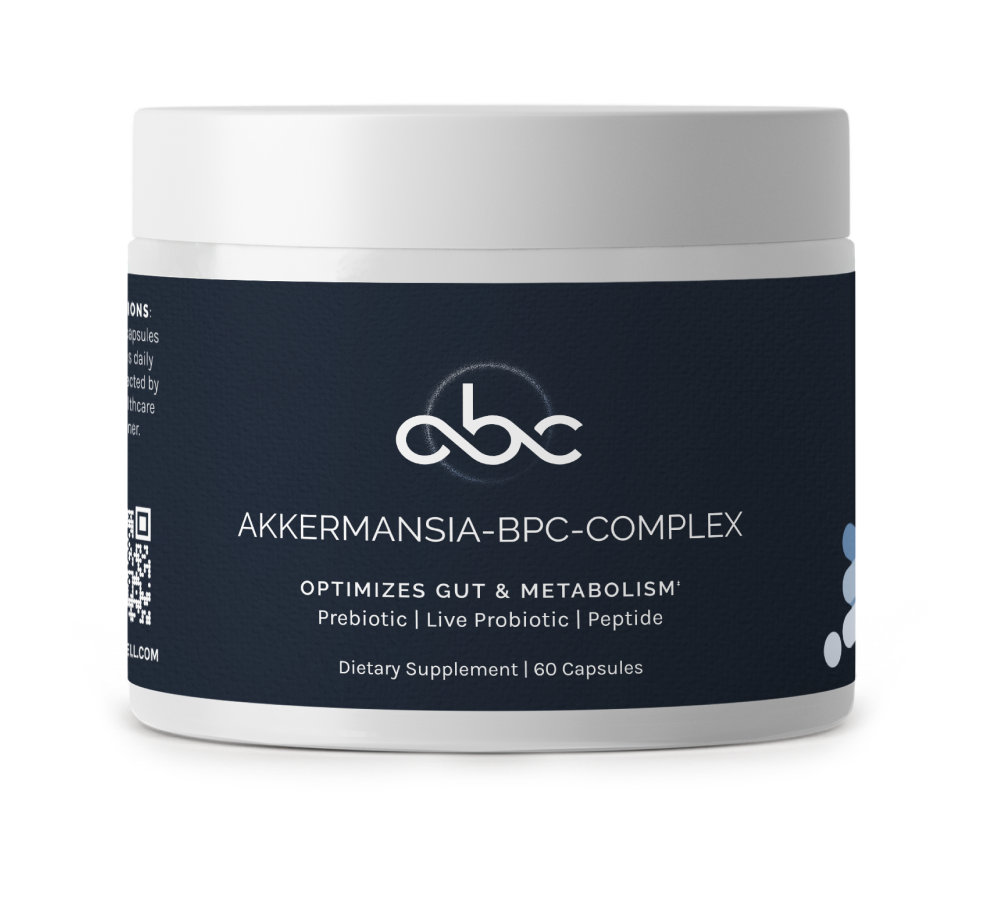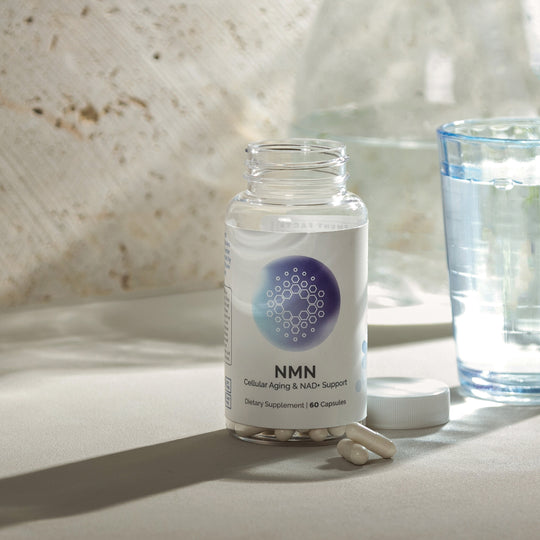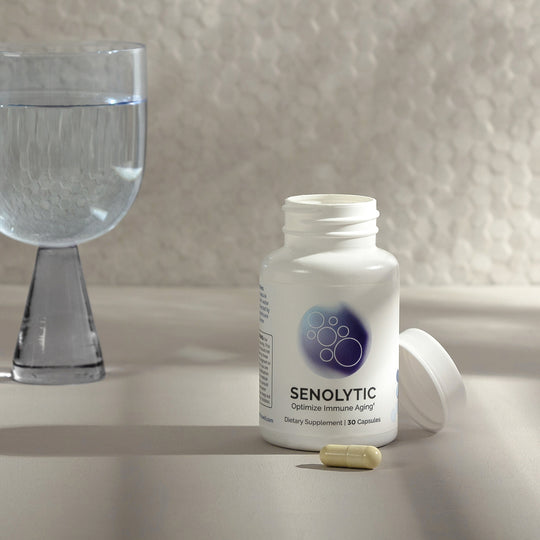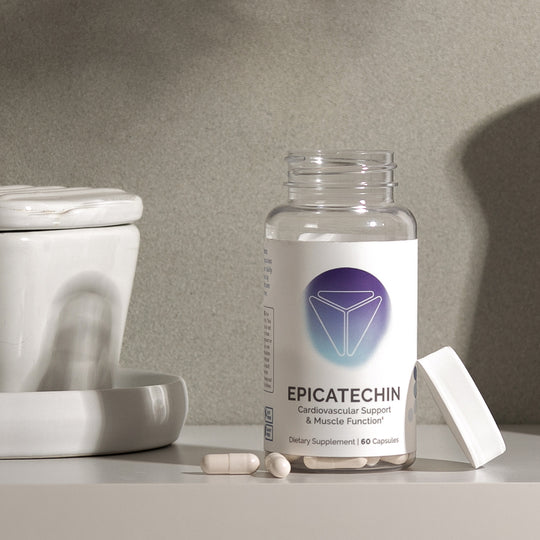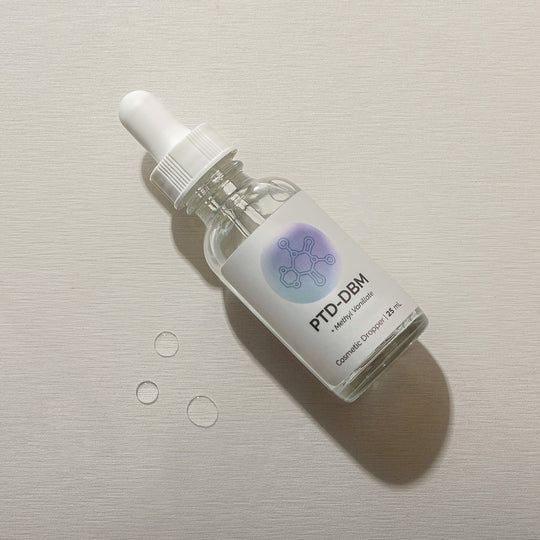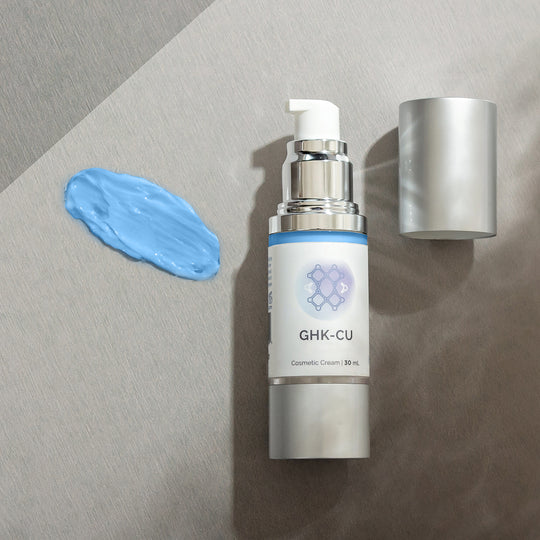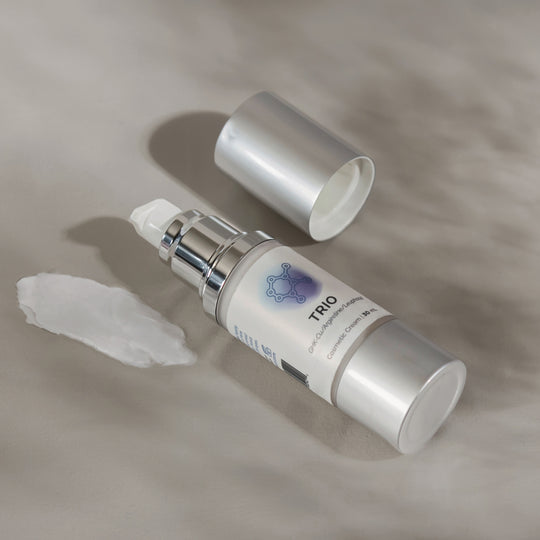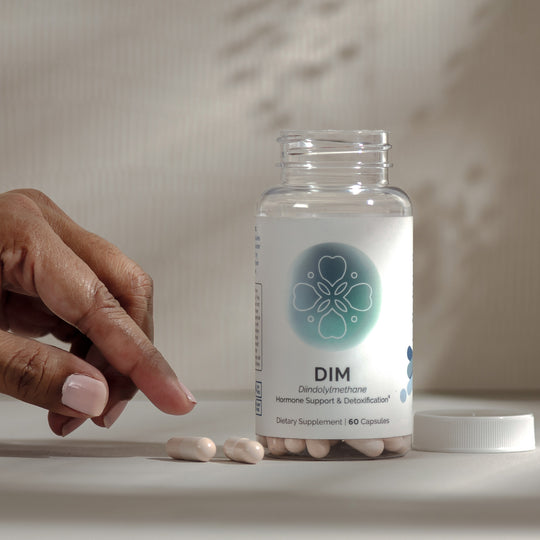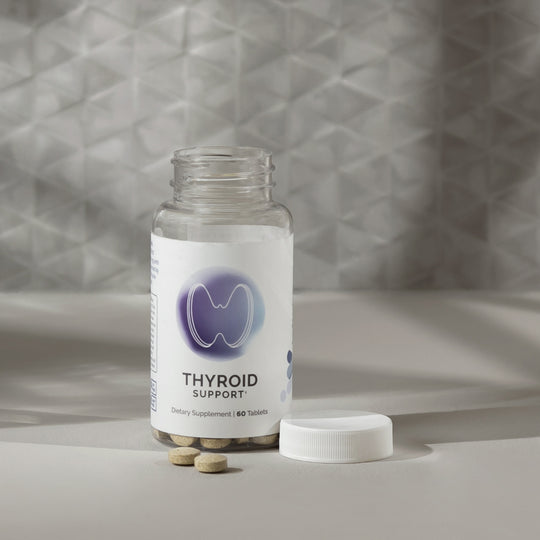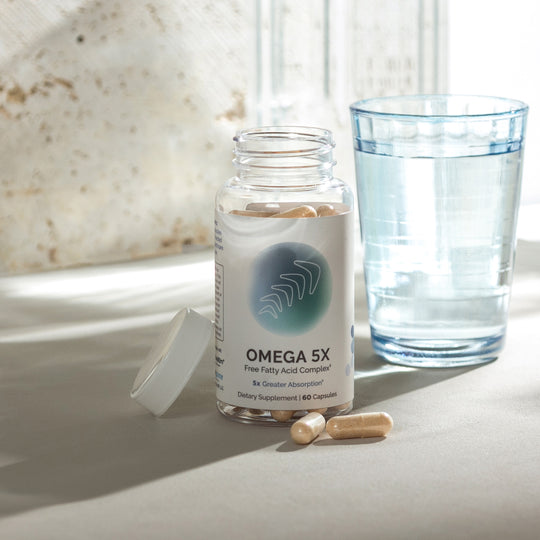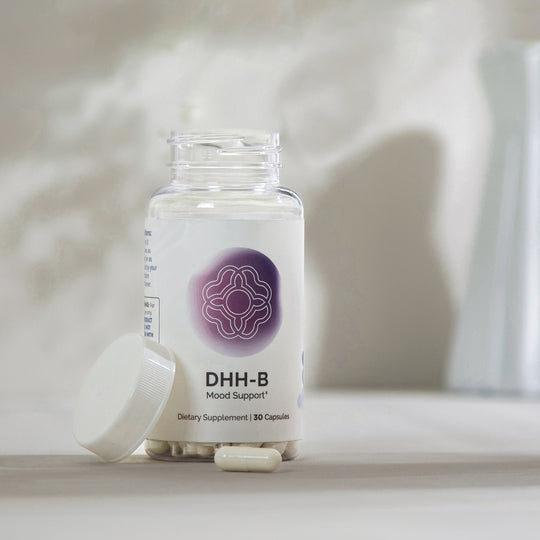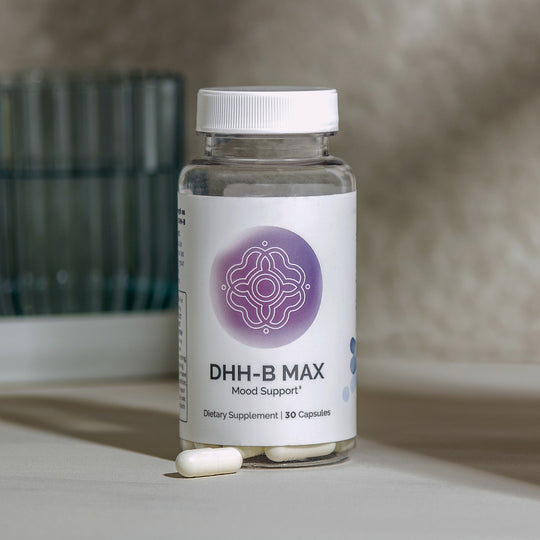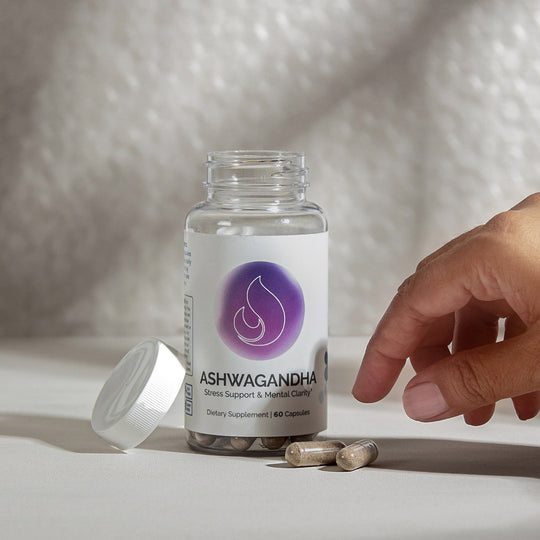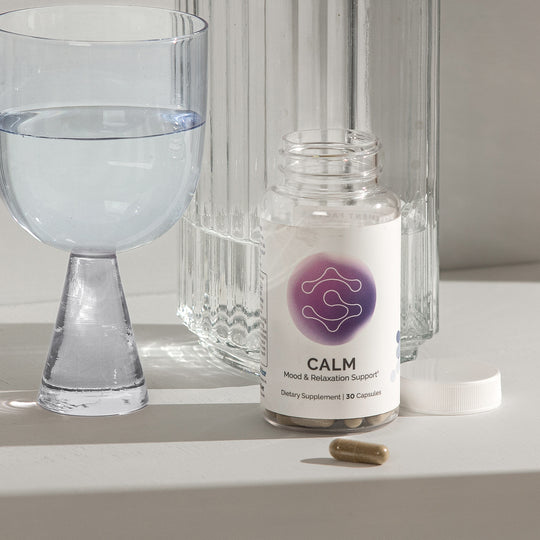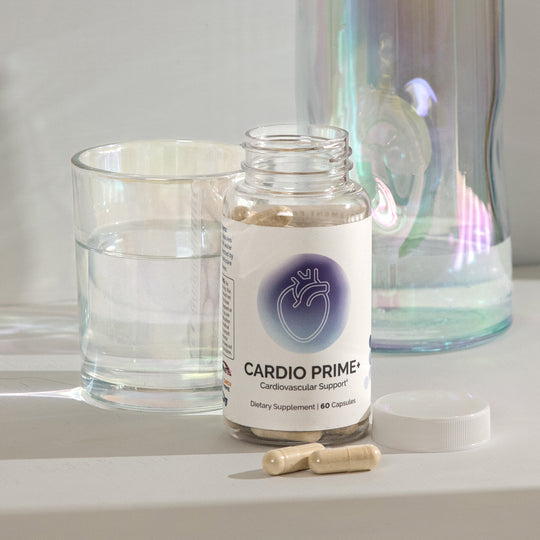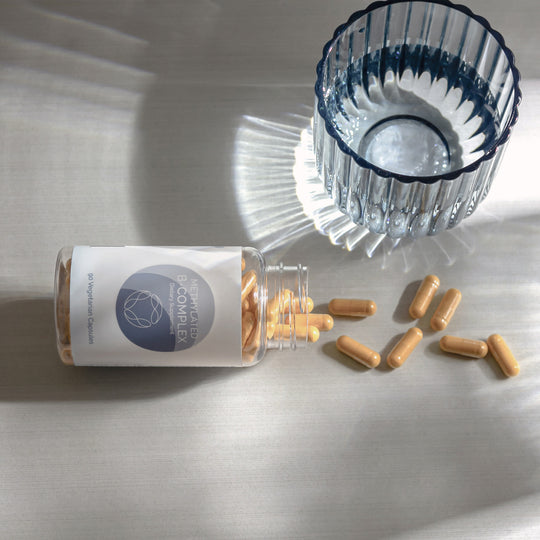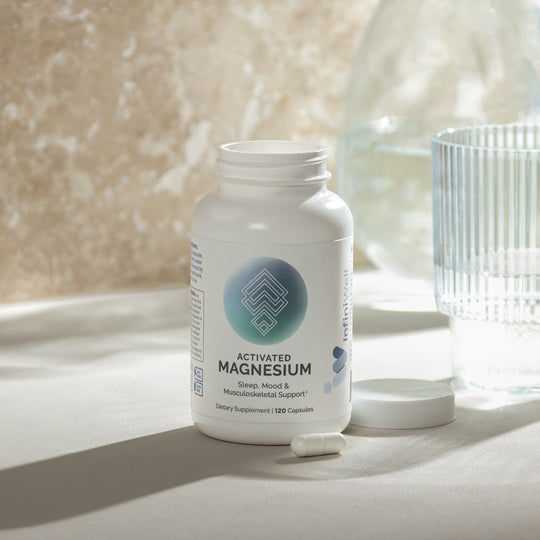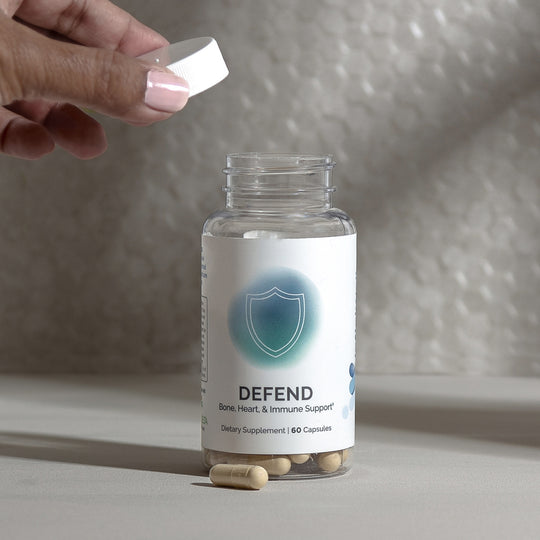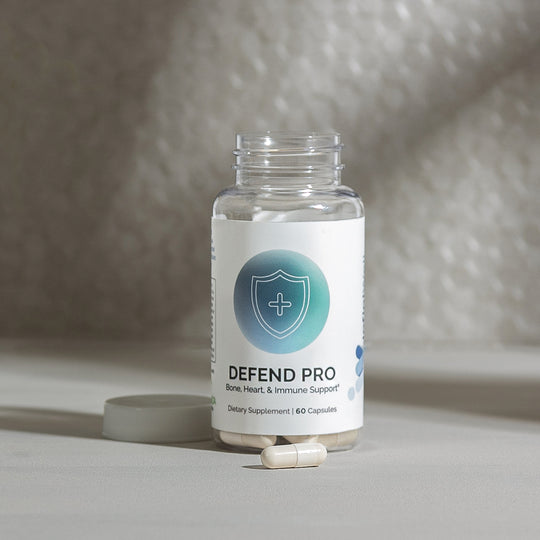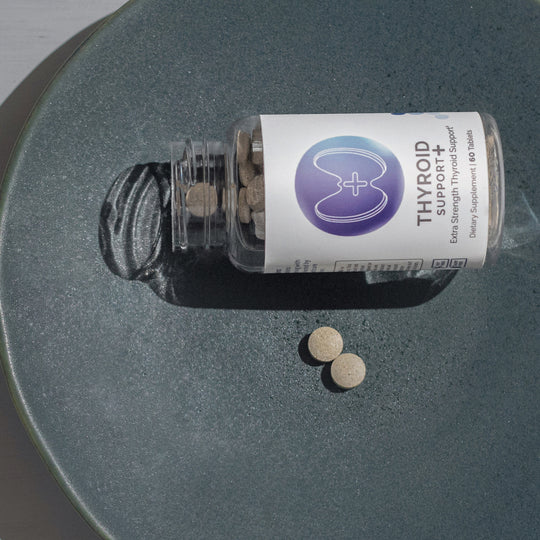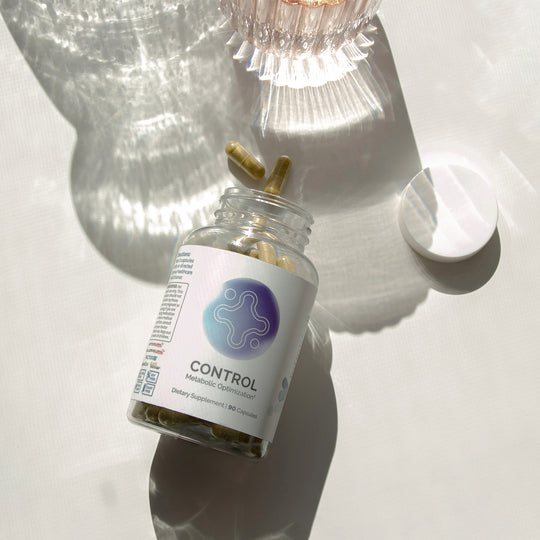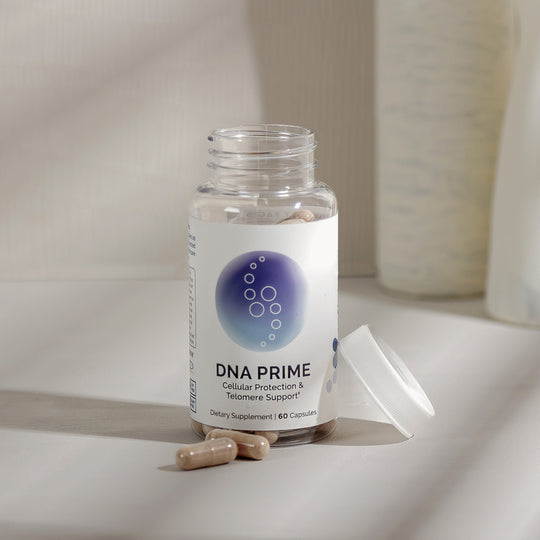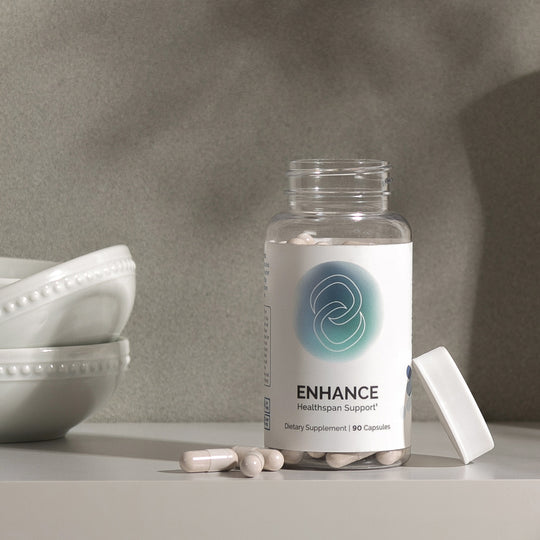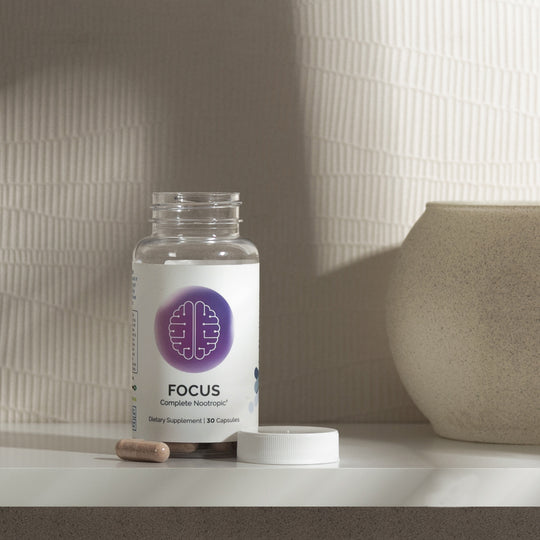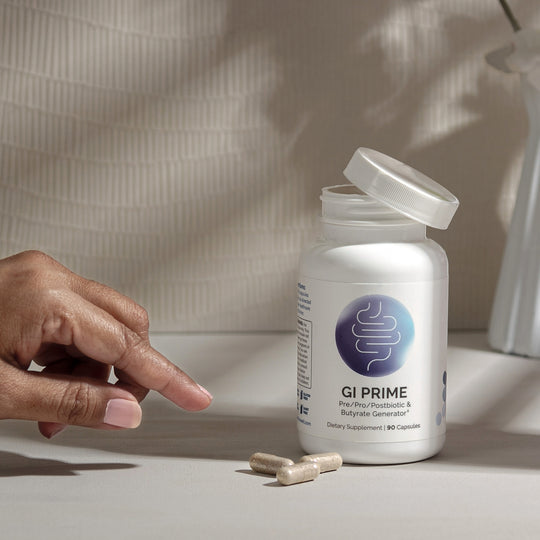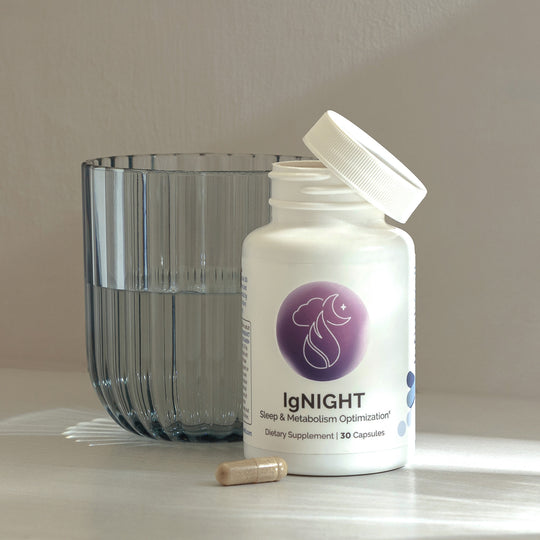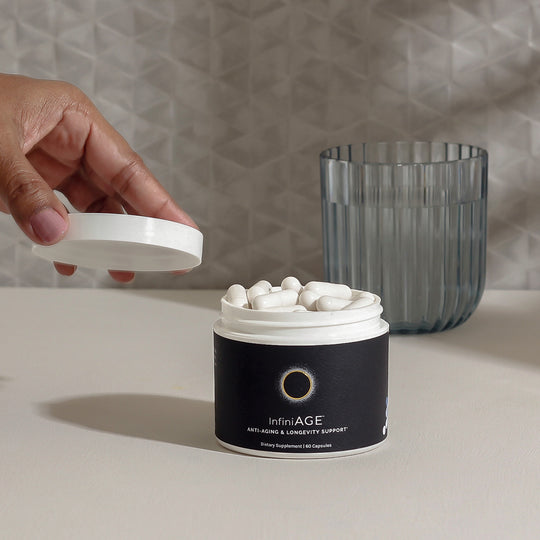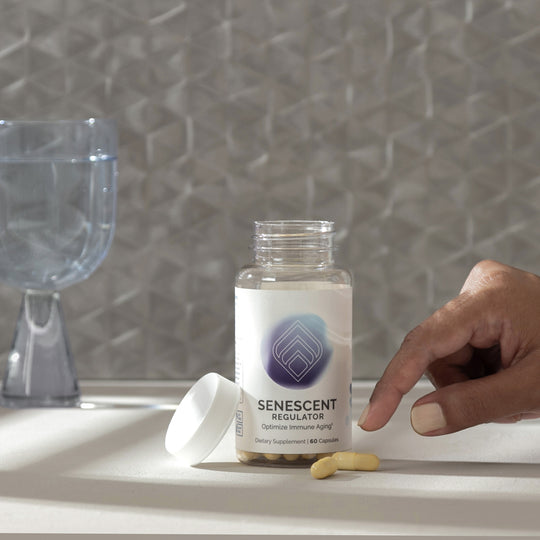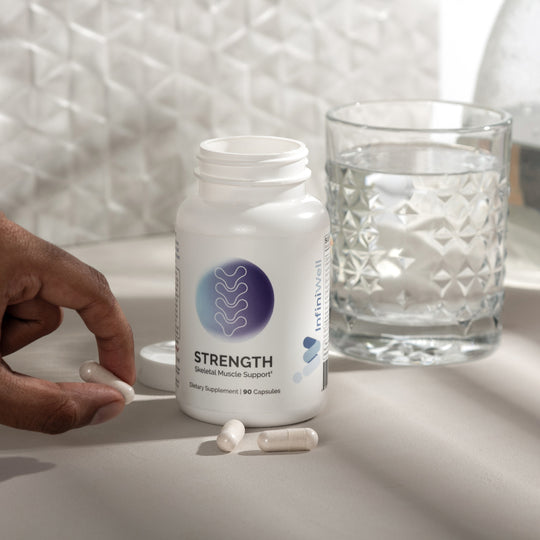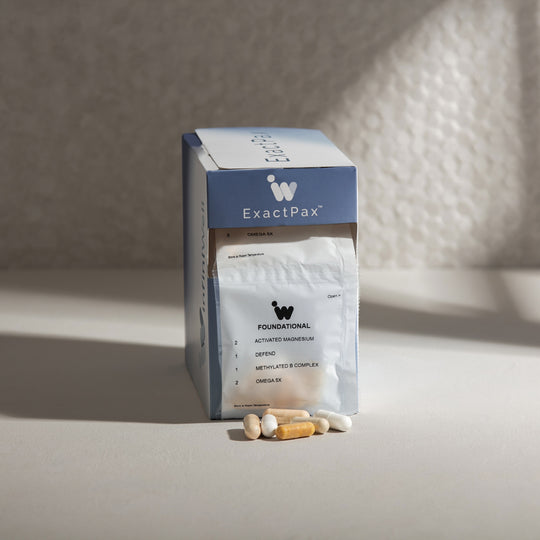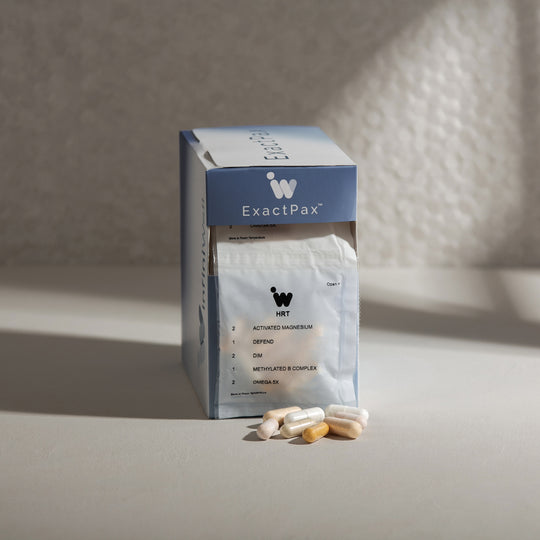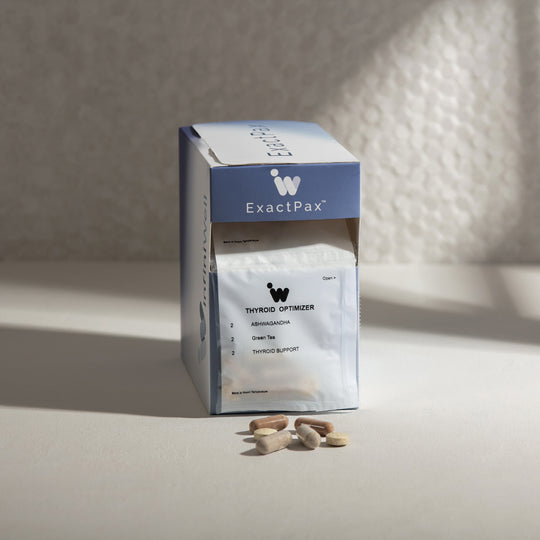MAGNESIO ACTIVADO
Sleep, Mood & Musculoskeletal Support*
- Supports Healthy Neurotransmitter Metabolism
- Promotes Vascular Relaxation & Pliability
- Maintains Healthy Levels of Melatonin
- Aids in Healthy Levels of ATP Production
Active Ingredients: Magnesium, Malic Acid
Other Ingredients: Rice Powder, Hydroxypropyl Methycellulose, Magnesium Stearate, Silicon Dioxide, Vegetable Capsule (Hypromellose, Titanium Dioxide)
Take 2 capsules daily or as directed by your healthcare provider
Daily
2 Capsules
Akkermansia
Prebiotic | Live Probiotic*
- Supports GLP-1 Production
- Promotes Metabolic Efficiency
- Aids in Optimizing Gut Barrier Integrity
- Promotes Leaner Body Composition
Active Ingredients: Akkermansia (Live Akkermansia muciniphila), Sunfiber® Prebiotic (Galactomannan Fiber)
Other Ingredients: Vegetable Capsule (Hypromellose, Gellan Gum), Microcrystalline Cellulose, Magnesium Stearate
Take 1-2 capsules daily with water or as directed by your healthcare practitioner.
Daily
1-2 Capsules
ashwagandha
Stress Support and Mental Clarity*
- Promotes Hormonal Balance
- Supports Mental Clarity & Elevated Mood
- Facilitates An Optimal Environment For Normal Tissue Repair
- Optimizes Immune System Health
Active Ingredients: Ashwagandha, Black Pepper Extract
Other Ingredients: Vegetable Capsule (Hypromellose)
Take 2 capsules daily with water or as directed by your healthcare practitioner.
Daily
2 capsules
BPC-157 RETARDADO - 250MCG
Muscle, Joint & Gut Support*
- Joint and Soft Tissue Support
- Promotes Digestive Function
- Neurological Support
- Optimizes Nitric Oxide Production
Active Ingredient: Body Protective Compound, Salcaprozate Sodium (SNAC)
Other Ingredients: Rice Powder, Microcrystalline Cellulose, Vegetable Capsule (Hypromellose, Gellan Gum)
Take 1 capsule twice daily or as directed by your healthcare practitioner.
Twice daily
1 Capsule
BPC-157 PRO RETARDADO - 500MCG
Muscle, Joint & Gut Support*
- 60 Capsules
- 30 Capsules
- Joint and Soft Tissue Support
- Promotes Digestive Function
- Neurological Support
- Optimizes Nitric Oxide Production
Active Ingredient: Body Protective Compound, Salcaprozate Sodium (SNAC)
Other Ingredients: Rice Powder, Microcrystalline Cellulose, Vegetable Capsule (Hypromellose, Gellan Gum)
Take 1 capsule twice daily or as directed by your healthcare practitioner.
Twice daily
1 Capsule
BPC-157 Original - 250MCG
Muscle, Joint & Gut Support*
- Joint and Soft Tissue Support
- Promotes Digestive Function
- Neurological Support
- Optimizes Nitric Oxide Production
Active Ingredient: Body Protective Compound
Other Ingredients: Other Ingredients: Rice Powder, Microcrystalline Cellulose, Vegetable Capsule (Hypromellose)
Take 1 capsule twice daily or as directed by your healthcare practitioner.
Twice daily
1 Capsule
BPC-157 TABLETAS PRO - 500MCG
Muscle, Joint & Gut Support*
- Joint and Soft Tissue Support
- Promotes Digestive Function
- Neurological Support
- Optimizes Nitric Oxide Production
Active Ingredient: Body Protective Compound, Salcaprozate Sodium (SNAC)
Other Ingredients: Calcium Carbonate, Microcrystalline Cellulose, Stearic Acid, Croscarmellose Sodium, Magnesium Stearate, Silicon Dioxide
Take 1 tablet twice daily or as directed by your healthcare practitioner.
Twice daily
1 Tablet
BPC-157 Probiotic | ABC
Peptide | Live Probiotic*
- Supports Healthy Gut Microbiota
- Aids in Optimizing Gut Barrier Integrity
- Helps Promote GLP-1 Production
- Promotes Leaner Body Composition
Active Ingredients: Akkermansia (Live Akkermansia muciniphila), Body Protective Compound 250mcg (as BPC-157 Arginate Salt), Sunfiber® Prebiotic (Galactomannan Fiber), Salcaprozate Sodium (SNAC)
Other Ingredients: Vegetable Capsule (Hypromellose, Gellan Gum), Microcrystalline Cellulose, Magnesium Stearate
Take 1-2 capsules two times daily with water or as directed by your healthcare practitioner.
Daily
1-2 Capsules
BPC-157 RÁPIDO - 250MCG
Muscle, Joint & Gut Support*
- Joint and Soft Tissue Support
- Promotes Digestive Function
- Neurological Support
- Optimizes Nitric Oxide Production
Active Ingredient: Body Protective Compound, Salcaprozate Sodium (SNAC)
Other Ingredients: Rice Powder, Microcrystalline Cellulose, Vegetable Capsule (Hypromellose)
Take 1 capsule twice daily or as directed by your healthcare practitioner.
Twice daily
1 Capsule
BPC-157 RÁPIDO PRO - 500MCG
Muscle, Joint & Gut Support*
- 60 Capsules
- 30 Capsules
- Joint and Soft Tissue Support
- Promotes Digestive Function
- Neurological Support
- Optimizes Nitric Oxide Production
Active Ingredient: Body Protective Compound, Salcaprozate Sodium (SNAC)
Other Ingredients: Rice Powder, Microcrystalline Cellulose, Vegetable Capsule (Hypromellose)
Take 1 capsule twice daily or as directed by your healthcare practitioner.
Twice daily
1 Capsule
BPC-157 Smart Chocolate
BPC-157 & Cognizin®*
- Supports Healthy Overall Brain Function
- Aids in Alertness, Focus and Attention
- Promotes Brain DNA Synthesis and Repair
- Maintains An Optimal Gut/Brain Axis
Body Protective Compound 250mcg (as BPC-157 Arginate Salt), Cognizin® Citicoline
Other ingredients: Cocoa Liquor, Cocoa butter, Sunflower Lecithin, Natural Cherry Flavor WONTF
Enjoy 1 smart chocolate daily or as directed by your healthcare practitioner.
Daily
1 smart chocolate
BPC-157 TABLETAS - 250MCG
Muscle, Joint & Gut Support*
- Joint and Soft Tissue Support
- Promotes Digestive Function
- Neurological Support
- Optimizes Nitric Oxide Production
Active Ingredient: Body Protective Compound, Salcaprozate Sodium (SNAC)
Other Ingredients: Calcium Carbonate, Microcrystalline Cellulose, Stearic Acid, Croscarmellose Sodium, Magnesium Stearate, Silicon Dioxide
Take 1 tablet twice daily or as directed by your healthcare practitioner.
Twice daily
1 Tablet
CALMA
Tranquility, Focus, and Cognitive Vitality*
- Promotes Relaxation & Stress Reduction
- Aids Improved Mood & Mood Stabilization
- Supports Neurological Health
- Supports Cognitive Performance
Active Ingredients: DHH-B (Dihydrohonokiol-B), L-TeaActive® (L-Theanine), BaCognize® (Bacopa monnieri)
Other Ingredients: Rice Powder, NuMag, NuFlow, Vegetable Capsule (Hypromellose)
Take 1 capsule as needed or as directed by your healthcare practitioner.
As needed
1 Capsule
SHOULD NOT BE TAKEN WITH ALCOHOL
CARDIO PRIME+
Advanced Cardiometabolic Support*
- Supports Vessel Health & Pliability
- Aids in Blood Pressure Regulation
- Supports Fibrinolytic Activity
- Maintains Already Healthy Cholesterol Levels
- Promotes Healthy Blood Sugar & Insulin Metabolism
Active Ingredients: Niacin, Copper, NAD3® Proprietary Blend (Wasabi Extract, Theacrine, Cuprous Niacin), Lactotripeptides, VasoDrive AP®, Citrus Bergamot Extract, CurcuPrime® Tetrahydrocurcumin, NSK-SD® Nattokinase
Other Ingredients: Microcrystalline Cellulose, Magnesium Stearate (Vegetable), Silica, Vegetable Capsule (Hypromellose). Contains soy and milk.
Take 2 capsules daily with water or as directed by your healthcare practitioner.
Daily
2 Capsules
CARDIOVASCULAR
Advanced Cardiometabolic Support*
- Supports vessel health & pliability
- Aids in blood pressure regulation
- Supports fibrinolytic activity
- Maintains already healthy cholesterol levels
- Promotes healthy blood sugar & insulin metabolism
- Cardio Prime+
- Green Tea
- CoQ10
Take 1 packet daily, in the morning on an empty stomach at least 1 hour before a meal, or as directed by your healthcare practitioner.
Daily
1 Packet
CONTROL
Glucose Metabolism & Insulin Sensitivity*
- Encourages Calorie Burn
- Promotes Leaner Body Composition
- Helps Regulate Metabolism
- Supports Healthy Blood Glucose Levels
- Assists in Preventing Weight Re-gain
- Reinforces Carbohydrate Tolerance
Active Ingredients: MitoBurn® (B-aminoisobuytric acid, L-BAIBA), Factor21® Bitter Melon Extract (Momordica charantia), Berberine HCL, GlucoVantage® (Dihydroberberine), InnoSlim® (Astragalus membranaceus and Panax notoginseng) Root Extracts, Actiponin® gynostemma pentaphyllum extract, CaloriBurn GP® Grains of Paradise seed extract
Other Ingredients: Vegetable Capsule (Hypromellose, Gellan Gum), Rice Powder, Microcrystalline Cellulose
Take 3 capsules daily or as directed by your healthcare practitioner.
Daily
3 Capsules
CoQ10
Cellular Energy Production*
- Supports Cardiovascular Health
- Boosts Antioxidant Activity
- Promotes Neurological Health
- Maintains Healthy Blood Sugar Balance
- Enhanced Cellular Energy and Physical Performance
Active Ingredients: Coenzyme Q10
Other Ingredients: Microcrystalline Cellulose, Magnesium Stearate, Silicon Dioxide, Vegetable Capsule (Hypromellose)
Take 1 capsule daily or as directed by your healthcare provider
Daily
1 Capsule
DEFENDER
Foundational Combination of Vitamins A, D, & K2*
- Supports Healthy Calcium Deposition in Bones & Teeth
- Promotes Broad Immune System Activation
- Supports Healthy Levels of Oxidation within Blood Vessels
- Aids in the Metabolism of Lipids
Active Ingredients: Vitamin A, Vitamin D, Vitamin E, Vitamin K2 MK-7, AstraGin® (Astragalus membranaceus and Panax notoginseng) Root Extracts
Other Ingredients: Nuflow, Vegetable Capsule (Hypromellose)
Take 1 capsule daily or as directed by your healthcare practitioner.
Daily
1 Capsule
DEFENDER PRO
Foundational Combination of Vitamins A, D, & K2*
- Supports Healthy Calcium Deposition in Bones & Teeth
- Promotes Broad Immune System Activation
- Supports Healthy Levels of Oxidation within Blood Vessels
- Aids in the Metabolism of Lipids
Active Ingredients: Vitamin A, Vitamin D, Vitamin E, Vitamin K2 MK-7, AstraGin® (Astragalus membranaceus and Panax notoginseng) Root Extracts
Other Ingredients: Nuflow, Vegetable Capsule (Hypromellose)
Take 1 capsule daily or as directed by your healthcare practitioner.
Daily
1 Capsule
DHH-B
Mood Support*
- Promotes an Overall Sense of Calm
- Helps Promote Relaxation & Reduced Nervousness
- Maintains Healthy Neurotransmitter Release (Specifically, GABA)
- Promotes Both Healthy REM & Non-REM Sleep Cycles
Active Ingredient: DHH-B (Dihydrohonokiol-B)
Other Ingredients: Cellulose, Rice Powder, Hydroxypropyl Methylcellulose, Magnesium Stearate, Silicon Dioxide, Vegetable Capsule (Hypromellose, Titanium Dioxide)
Take 1 capsule as needed or as directed by your healthcare practitioner.
As needed
1 Capsule
SHOULD NOT BE TAKEN WITH ALCOHOL.
DHH-B MAX
Mood Support*
- Promotes an Overall Sense of Calm
- Helps Promote Relaxation & Reduced Nervousness
- Maintains Healthy Neurotransmitter Release (Specifically, GABA)
- Promotes Both Healthy REM & Non-REM Sleep Cycles
Active Ingredient: DHH-B (Dihydrohonokiol-B)
Other Ingredients: Cellulose, Rice Powder, Hydroxypropyl Methylcellulose, Magnesium Stearate, Silicon Dioxide, Vegetable Capsule (Hypromellose, Titanium Dioxide)
Take 1 capsule as needed or as directed by your healthcare practitioner.
As needed
1 Capsule
SHOULD NOT BE TAKEN WITH ALCOHOL.
OSCURO
Hormone Support & Detoxification*
- Supports Healthy Estrogen Metabolism
- Promotes Leaner Body Composition
- Aids Liver Detoxification
- Supports Antioxidant Capacity
Active Ingredients: DIM (Diindolylmethane)
Other Ingredients: Microcrystalline Cellulose, Magnesium Stearate, Silicon Dioxide, Vegetable Capsule (Hypromellose, Titanium Dioxide)
Take 2 capsules daily with water or as directed by your healthcare practitioner.
Daily
2 Capsules
ADN PRIMO
Cellular Protection & Telomere Support*
- Supports telomere length and telomerase activity
- Supports DNA repair and cellular renewal
- Promotes mitochondrial function
- Aids in the mitigation of oxidative stress
Active Ingredients: ac-11® Cat's Claw Aqueous Extract (Uncaria tomentosa), Activated BroccoRaphanin® (Broccoli concentrate from seed and myrosinase enzyme), Sulforaphane Glucosinolate (as Glucoraphanin), Buckwheat Peptides 20:1, 2-HOBA (Hobamine®), L-Ergothioneine (as MitoPrime®)
Other Ingredients: Microcrystalline Cellulose, Magnesium Stearate (Vegetable), Silica, Vegetable Capsule (Hypromellose)
Take 2 capsules daily or as directed by your healthcare practitioner.
Daily
2 Capsules
DÚO
Hair Nourishment*
- Supports Follicular Proliferation & Differentiation
- Promotes Growth Factors Involved in Hair Growth & Maintenance
- Aids the Nourishment & Health of Hair Follicles
- Supports the Structure & Strength of Hair Strands
This advanced formula harnesses the power of two key ingredients: GHK-Cu and Zn-Thymulin. This physician formulated serum is fast-absorbing and aims to produce visible results in less than 30 days. Together, GHK-Cu and Zn-Thymulin work synergistically to enhance ongoing nourishment and revitalization of the scalp, promoting the visible appearance of thick, lustrous hair.
Apply evenly to affected areas of scalp once daily. Avoid contact with eyes.
Daily
Apply evenly to affected areas of scalp.
MEJORAR
Healthspan & Longevity Support*
- Promotes Longevity, Cellular Renewal & Autophagy
- Supports Heart Health & Mitochondrial Free Radicals
- Assists Cellular Detox & Optimizes Nrf2 Pathways
- Supports Stamina + Endurance & Protein Synthesis
- Maintains Lipid & Blood Sugar Regulation + Energy Production
Active Ingredients: Arginine Alpha-Ketoglutarate, Trimethylglycine, Bergamot Orange Extract, Bergamonte®, Epigallocatechin Gallate, Taxifolin, Spermidine
Other Ingredients: Vegetable Capsule (Hypromellose, Titanium Dioxide)
Take 3 capsules daily with water or as directed by your healthcare practitioner.
Daily
3 Capsules
EPICATECINA
Cardiovascular Support & Muscle Function*
- Strength Gains
- Stamina & Endurance
- Nitric Oxide Support
- Antioxidant & Metabolic Support
- Muscle Protein Synthesis & Muscle Recovery
Active Ingredient: Epicatechin
Other Ingredients: Vegetable Capsule (Hypromellose, Titanium Dioxide)
Take 2 capsules daily with water or as directed by your healthcare practitioner.
Daily
2 Capsules
ENFOCAR
Breakthrough Nootropic For Everyone*
- Optimized Neurological Processing and Function
- Sustained Mental Acuity and Recall
- Short & Long Term Brain / Working Memory Support
- Blue Light Protection from Digital Devices
Active Ingredients: RhodioPrime® 6X Rhodiola - Rhodiola rosea, LuteMax2020 - Lutein and zeaxanthin, InnovaTea® - Caffeine, DynamineTM - methylliberine, TeaCrine® - Theacrine, Huperzine A
Other Ingredients: Vegetable Capsule (Hypromellose, Gellan Gum), Rice Powder, Microcrystalline Cellulose
Take 1 capsule in the morning with water or as directed by your healthcare practitioner.
As needed
1 Capsule
FUNDACIONAL
Foundational Combination of Nutrients
- FUNDACIONAL
- FUNDACIONAL+
- Supports Immune Function & Immune Cell Activation
- Supports Strong Bones, Calcium Absorption & Metabolism
- Supports Cardiovascular Function
- Supports Neurological Function & Methylation Optimization
- Defend / Defend Pro
- Activated Magnesium
- Methylated B-Complex
- Omega 5x
Take 1 packet daily, with a meal, or as directed by your healthcare practitioner.
Daily
1 Packet
GHK-CU
Skin Hydration & Nourishment*
- Aids Reduced Muscle Activity Leading to Wrinkles & Fine Lines
- Supports Healthy Levels of Elastin, Proteoglycans, & Glycosaminoglycans
- Promotes Healthy Collagen Synthesis
GHK-Cu was formulated to help provide a reduced appearance of wrinkles and fine lines. GHK-Cu works into the skin easily, with a smooth finish on the skin.
Apply 4 pumps to face (or desired area) once daily. Avoid contact with eyes.
Daily
4 Pumps
GI PRIMO
Comprehensive Pre/Pro/Post Biotic Formula*
- Supports a Healthy Gut Microbiota
- Strengthens Immune System
- Aids in Optimizing Gut Barrier Integrity
- Modulates Immune Response in the Gut via Activation of pDC’s
- Supports Digestive Function & Regularity
Active Ingredients: Dried Yeast Fermentate (EpiCor®) (Saccharomyces cerevisiae), Lactococcus lactis strain Plasma (IMMUSE™ Paraprobiotic), ButyraGen™, Spore Probiotic Blend - Bacillus Coagulans (SNZ 1969), Bacillus Subtillus (SNZ 1972), Bacillus Clausii (SNZ 1971)
Other Ingredients: Vegetable Capsule (Hypromellose), Rice Powder, Microcrystalline Cellulose, Magnesium Stearate, Silicon Dioxide.
Take 3 capsules daily or as directed by your healthcare practitioner.
Daily
3 Capsules
GLYNAC
Elevate Health through Glycine & NAC*
- Supports Antioxidant Capacity
- Supports Glutathione Synthesis
- Promotes Mitochondrial Function
- Aids in Nutrient Sensing
Active Ingredients: Glycine, N-Acetyl L-Cysteine
Other Ingredients: Vegetable Capsule (Hypromellose), Rice Powder, Magnesium Stearate, Silicon Dioxide.
Take 2 capsules with water daily or as directed by your healthcare practitioner.
Daily
2 Capsules
SOPORTE TRH
Hormone Support & Detoxification*
- SOPORTE TRH
- SOPORTE TRH+
- Supports Sex Hormone Metabolism Through Phase 1 Detoxification
- Supports Immune Function & Immune Cell Activation
- Supports Strong Bones, Calcium Absorption & Metabolism
- Supports Cardiovascular Function
- Supports Neurological Function & Methylation Optimization
- Diindolylmethane
- Defend / Defend Pro
- Activated Magnesium
- Methylated B-Complex
- Omega 5X
Take 1 packet daily, with a meal, or as directed by your healthcare practitioner.
Daily
1 Packet
ENCENDIDO
The Key to Optimal Sleep & Metabolic Health*
- Increases Restorative Sleep
- Supports High Quality Sleep
- Encourages Calorie Burn
- Promotes Leaner Body Composition
Active Ingredients: Sleeproot ValerianTM - Valeriana officialis, Shoden® Ashwagandha, Dihydrohonokiol-B (DHH-B), CaloriBurn GP®
Other Ingredients: Vegetable Capsule (Hypromellose), Rice Powder, Magnesium Stearate, Silicon Dioxide.
Take 1 capsule 30 mins before bed or as directed by your healthcare practitioner.
30 Minutes before bed as needed
1 Capsule
SHOULD NOT BE TAKEN WITH ALCOHOL.
Immune Shield
- Supports Immune Function & Immune Cell Activation
- Modulates Immune Response in the Gut via Activation of pDC's
- Aids in Optimizing Gut Barrier Integrity
- Supports Heart Health & Mitochondrial Free Radicals
- Defend Pro
- GI Prime
- Enhance
Take 1 packet daily, with a meal, or as directed by your healthcare practitioner.
Daily
1 Packet
InfiniAge™
OMICm Age & Pace of Aging Optimization*
- Aids Antioxidant Capacity
- Promotes Cholesterol Profiling
- Optimizes Nutrient Sensing Pathways
- Optimizes Mitochondrial Function
- Supports Cognitive Function & Brain Aging
Active Ingredients: Zinc, Calcium, N-Acetyl L-Cyteine, Lutein, Eclipse Bio-Age Complex (Calcium alpha-ketoglutarate, Uridine monophosphate, L-Ergothioneine, Chokeberry Extract)
Other Ingredients: Magnesium Stearate, Silicon Dioxide, Vegetable Capsule (Hypromellose)
Take 2 capsules daily or as directed by your healthcare practitioner.
Daily
2 Capsules
LONGEVIDAD
Cellular Protection & Telomere Support*
- LONGEVIDAD
- LONGEVIDAD+
- Promotes Longevity & Cellular Renewal
- Supports Stamina/Endurance & Protein Synthesis
- Supports Heart Health & Mitochondrial Function
- Maintains Lipid metabolism & Energy Production
- NMN
- Senolytic
- Senescent Regulator
- DNA Prime
- Enhance
Take 1 packet daily, in the morning on an empty stomach at least 1 hour before a meal, or as directed by your healthcare practitioner.
Daily
1 Packet
ACTIVADOR METABÓLICO
Glucose Metabolism & Insulin Sensitivity*
- Optimized Metabolism, Microbiome & GLP-1 Support
- Body Composition & Conversion of White to Brown Fat
- Insulin Sensitivity Support & FGF21 Activation
- Metabolic, Blood Sugar & AMPK Support
- Promotes Beta Cell Function
- Senolytic
- Control
- GI Prime
Take 1 packet daily, with a meal, or as directed by your healthcare practitioner.
Daily
1 Packet
COMPLEJO B METILADO
High Potency, Comprehensive B-Complex*
- Supports Healthy Methylation & Carbohydrate Metabolism
- Promotes Nervous System, Immune & Adrenal Health
- Supports Neurotransmitter Production For A Positive Mood
- Protects Against Stress-Induced Nutrient Depletion
Active Ingredients: Thiamine (Vitamin B1), Riboflavin (Vitamin B2), Niacin, Vitamin B6, Folate, Vitamin B12, Biotin, Pantothenic Acid, Choline Bitartrate, Inositol
Other Ingredients: Hydroxypropyl Methycellulose, Magnesium Stearate, Silicon Dioxide, Vegetable Capsule (Hypromellose)
Take 1 capsule daily or as directed by your healthcare practitioner.
Daily
1 Capsule
nmn
The Vanguard of Anti-Aging Science*
- Supports NAD+ Production
- Promotes Longevity & Healthy Aging
- Helps Maintain Healthy DNA & Epigenetic Function
Active Ingredients: Nicotinamide Mononucleotide, Resveratrol, Pterostilbene
Other Ingredients: Hypromellose, Titanium Dioxide
Take 2 capsules daily with water or as directed by your healthcare practitioner.
Daily
2 Capsules
OMEGA 5x
Unlock the Therapeutic Potential of Omega-3*
- Contains Bioavailability Enhancement of Up to 5X vs. Conventional Fish Oil
- Supports Various Aspects of Cardiometabolic Health
- Facilitates Utilization of All Omega Fatty Acids in the Diet
- Supports Healthy Levels of Inflammation throughout the Body
Active Ingredients: Omega-3 Lysine Complex, SmartPrime-Om™ Complex, AstraGin® Root Extracts
Other Ingredients: Magnesium Stearate, Silica, Hypromellose. Contains Fish.
Take 2 capsules with water daily or as directed by your healthcare practitioner.
Daily
2 Capsules
Contains fish
PTD-DBM + VAINILLATO DE METILO
Hair Restoration and Growth*
- Supports the Wnt/β-catenin Signaling Pathway
- Supports Follicular Proliferation & Differentiation
- Aids the Integrity & Strength of the Hair Structure Itself
- Promotes Growth Factors Involved in Hair Follicle Development
PTD-DBM, a breakthrough peptide, is combined with Methyl Vanillate, a natural compound derived from vanillin, both of which are vital for optimizing the environment for hair growth. With their powerful mechanisms of action and easy, fast-absorbing topical application, PTD-DBM and Methyl Vanillate offer the ideal solution for those seeking novel, effective ways to jumpstart their hair follicles and begin the journey toward visibly improving the appearance of full, thick hair. This physician formulated serum is fast-absorbing and aims to produce visible results in less than 30 days.
Apply evenly to affected areas of scalp once daily. Avoid contact with eyes.
Daily
As needed.
Avoid contact with eyes.
REPARACIÓN Y RECUPERACIÓN
Muscle, Joint, Gut-Brain Axis & Digestive Support*
- REPARACIÓN Y RECUPERACIÓN
- REPARACIÓN Y RECUPERACIÓN+
- Muscle Protein Synthesis & Recovery
- Strength Gains & Mitochondrial Neogenesis
- Mucosal Barrier Support & AMPK Activation
- Body Composition Support & Cortisol Regulation
- BPC-157
- Strength
- Ashwagandha
Take 1 packet daily with a meal, or as directed by your healthcare practitioner.
Daily
1 Packet
REGULADOR SENESCENTE
Rejuvenation and Metabolic Regulation*
- Aids Body’s Process of Reusing Old & Damaged Cell Parts
- Supports Healthy mTOR Inhibition & AMPK Expression
- Promotes Healthy, Youthful Cellular Function
Active Ingredients: TumiPure Gold® Turmeric Extract, CurcuPrime® Tetrahydrocurcumin, Luteolin, Resveratrol, Pterostilbene
Other Ingredients: Vegetable Capsule (Hypromellose)
Take 2 capsules daily or as directed by your healthcare practitioner.
Daily
2 Capsules
SENOLÍTICO
Optimize Cellular Aging*
- Supports Healthy Aging & Longevity
- Optimizes Neurological Processing & Function
- Supports SIRT1 & AMPK Activation
- Helps Maintain Healthy Levels of Senescent Cells
Active Ingredients: Fisetin, Querciten, Resveratrol, Pterostilbene, Curcumin
Other Ingredients: Hypromellose, Titanium Dioxide
Take 1 capsule daily with water or as directed by your healthcare practitioner.
Daily
1 Capsule
FORTALEZA
Support For Muscle Mass & Tissue Quality*
- Muscle Protein Synthesis & Muscle Recovery
- Strength Gains
- Stamina & Endurance
- Body Composition
- Lipid Metabolism
- Enhanced Blood Flow
Active Ingredients: Calcium, myHMB® - B-Hydroxy B-Methylbutyrate, Epicatechin, PurpleForce® Purple Tea Leaf Extract, AstraGin® Root Extracts, Senactiv® Root Extracts
Other Ingredients: Rice Powder, Microcrystalline Cellulose, Hypromellose
Take 3 capsules daily with water or as directed by your healthcare practitioner.
Daily
3 Capsules
OPTIMIZADOR DE TIROIDES
Comprehensive Hormone Support*
- Optimizador de tiroides
- Optimizador de tiroides+
- Supports Healthy Thyroid Function
- Aids in the Synthesis of Thyroid Hormones
- Supports Cellular Sensitivity to Thyroid Hormones
- Helps Support Effective & Efficient Conversion of T4 to T3
- Promotes Healthy Antioxidant Capacity
- Thyroid Support / Thyroid Support+
- Ashwagandha
- Green Tea
Take 1 packet daily, in the morning on an empty stomach at least 1 hour before a meal, or as directed by your healthcare practitioner.
Daily
1 Packet
APOYO TIROIDES
Comprehensive Hormone Support*
- Supports Healthy Thyroid Function
- Aids in the Synthesis of Thyroid Hormones
- Supports Cellular Sensitivity to Thyroid Hormones
- Helps Support Effective and Efficient Conversion of T4 to T3
- Promotes a Healthy Inflammatory and Antioxidant Response
Active Ingredients: Selenium, Iodine, Vitamin K2, InfiniWell Blend (Hydroxytyrosol Acetate, Guggulsterone, Theobromine)
Other Ingredients: Microcrystalline Cellulose, Maltodextrin, Magnesium Stearate, Dicalcium Phosphate
Take 2 tablets in the morning or as directed by your healthcare practitioner.
Daily in the morning
2 Tablets
SOPORTE TIROIDES+
Comprehensive Hormone Support*
- Supports Healthy Thyroid Function
- Aids in the Synthesis of Thyroid Hormones
- Supports Cellular Sensitivity to Thyroid Hormones
- Helps Support Effective and Efficient Conversion of T4 to T3
- Promotes a Healthy Inflammatory and Antioxidant Response
Active Ingredients: Selenium, Iodine, Vitamin K2, Guggulsterone E-Z, Diiodo-L-Thyronine, InfiniWell Blend (Hydroxytyrosol Acetate, Theobromine)
Other Ingredients: Microcrystalline Cellulose, Maltodextrin, Magnesium Stearate, Dicalcium Phosphate
Take 2 tablets in the morning or as directed by your healthcare practitioner.
Daily in the morning
2 Tablets
TRÍO
Synergistic Solution for Facial Wrinkling*
- Aids Reduced Muscle Activity Leading to Wrinkles & Fine Lines
- Supports Healthy Levels of Moisture & Hydration
- Supports Healthy Collagen & Elastin Production
The InfiniWell Trio cosmetic has been shown to work synergistically to reduce the appearance of the depth of wrinkles. Trio Cosmetic easily works into the skin, and goes on skin with a smooth finish.
Apply 4 pumps to face (or desired area) once daily. Avoid contact with eyes.
Daily
4 Pumps
Avoid contact with eyes.
Yunique Medical - Productos InfiniWell
Yunique Medical - Productos InfiniWell FAQs
-
What is Yunique Medical?
Precision and longevity medicine—that's Yunique Medical's specialty. Its mission? To expand the dimensions of health by offering multifaceted solutions that address the full spectrum of wellness.With health optimization centers in Ocala, The Villages, and Port Orange, Florida, Yunique Medical, an InfiniWell affiliate, offers personalized treatments for hormone therapy, anti-aging, and functional wellness to target underlying imbalances.
-
What are bioregulators?
Bioregulators are naturally occurring compounds that help regulate various body functions—such as hormone levels, immune responses, and cellular processes—to maintain overall health.Think of them as your body's internal managers that make sure everything is in balance (a state known as homeostasis). By keeping your systems in check, bioregulators help you stay healthy and ensure your body functions the way it should.
Bioregulators come in different types, including:
Peptides
These are short chains of amino acids that act as signaling molecules (molecules that send signals from one cell to another to trigger specific actions), influencing how organs like your heart, liver, or kidneys perform. Examples of peptide bioregulators include:
- Insulin, which regulates blood sugar levels
- Growth hormone, which promotes growth and cellular regeneration
Hormones
Hormones are chemical messengers produced by glands like the pancreas, adrenal glands, and ovaries. They regulate long-term processes like growth, metabolism, and mood. Hormonal bioregulators help keep hormone levels balanced to ensure your body can effectively manage stress, produce energy, and meet other essential needs.
Examples of hormones include:
- Insulin, a peptide hormone secreted by the pancreas, which regulates blood glucose levels by helping cells absorb glucose from the bloodstream
- Cortisol, a steroid hormone produced by the adrenal glands, which helps regulate metabolism, immune response, and the body's response to stress
- Estrogen, a hormone produced primarily in the ovaries, which regulates the female reproductive system, menstrual cycle, and secondary sexual characteristics (e.g., the development of breasts and widening of the hips in females)
Growth factors
Growth factors are specialized bioregulators that play a key role in protein synthesis (the process by which cells produce proteins), tissue repair, and cell growth. They promote healing and regeneration by:
- Stimulating gene expression, where a cell reads and uses the information in a gene to produce proteins
- Activating genes in specific tissues, ensuring that cells divide, develop, and repair themselves efficiently
These bioregulators are crucial for regenerative medicine, as they help prevent premature aging and support the body's ability to regenerate tissue.
Some well-known growth factors include:
- Epidermal growth factor (EGF): Helps with skin and tissue regeneration, often found in skincare products.
- Vascular endothelial growth factor (VEGF): Aids in the growth of new blood vessels, which are crucial for wound healing and delivering oxygen and nutrients to tissues.
- Insulin-like growth factor (IGF): Plays a role in muscle growth and repair, as well as overall tissue maintenance.
Cytokines
Cytokines are signaling molecules that help coordinate the immune system's response to infections, injuries, and other threats. By managing immune activity and guiding immune cells to the right areas, cytokines help maintain the body’s biological reserve (its ability to respond to threats while preserving healthy tissue).
Clinical studies suggest that certain peptide bioregulators, such as Khavinson peptides, can influence cytokine activity. These regulatory peptides work at the cellular level to activate gene activity in a particular tissue, ensuring that immune responses are precise and do not cause excess damage to surrounding tissues.
Cytokines are integral to anti-aging and immunology research.
-
What are peptide bioregulators?
Peptide bioregulators are short chains of amino acids that help maintain balance in the human body by targeting specific biological processes, such as tissue repair, immune support, and hormone regulation.Examples include hormones, growth factors, and neuropeptides (signaling molecules that neurons in the brain and nervous system use to communicate with each other).
-
How do bioregulator peptides work?
Bioregulator peptides work by interacting with specific cells and tissues to restore or maintain balance within the body’s systems. They influence gene expression, where the cell uses genetic information to produce proteins or other molecules, promoting healthier function at the molecular level.These peptides come in short and long forms:
- Short peptides: Composed of 2-50 amino acids that target specific processes like tissue repair or immune support.
- Long peptides (also called polypeptides): Made up of more than 50 amino acids and are involved in more complex biological functions, such as protein synthesis and cell signaling, which help regulate broader physiological systems like growth and metabolism.
-
What is the difference between bioregulators and peptides?
Peptides are short chains of amino acids that perform various roles in the body, while bioregulators are molecules (including peptides) that target specific biological functions to regulate processes such as tissue repair, immune response, and hormonal balance.In essence, some peptides act as bioregulators, but not all peptides have this function. Bioregulators can be peptides, but they can also include larger molecules or non-protein substances (e.g., hormones, growth factors, or vitamins) that influence specific biological processes.
-
Are bioregulators the same as bio peptides?
No, they're not the same. Bioregulators target and regulate specific body processes, while peptides can have various roles beyond regulation, such as cell signaling and structural support.The term "bio peptides," although not a standard scientific term, can refer to bioregulator peptides. However, not all peptides are bioregulators, and not all bioregulators are peptides.
-
What are the benefits of using peptide bioregulators?
Peptide bioregulators can help with healthy aging, boost immune function, speed up recovery, and support organ health by influencing cellular processes and regulating biological functions at the cellular level.As signaling molecules, peptide bioregulators communicate with cells to guide important functions like gene expression, tissue repair, and hormone regulation. By doing so, they help the body function more efficiently and maintain homeostasis.
-
What is a bioregulator, and how does it support health?
A bioregulator is a natural compound, often a peptide, that helps the body maintain balance by regulating various processes like immune function, hormone levels, and organ health. Like a manager ensuring everything runs smoothly, a bioregulator restores equilibrium where needed, helping your body function optimally and respond more effectively to challenges like illness or stress. -
How do bio regulators affect the body?
A bio regulator acts on specific cells and tissues, helping balance the body's functions. It can:- Improve cellular communication: Help cells and systems coordinate more efficiently.
- Enhance immune response: Fortify the body's defenses against infections and other external threats.
- Support overall health: Help repair and regenerate tissues, regulate hormone levels, and ensure that organs work properly.
-
What is Ventfort bioregulator used for?
Ventfort bioregulator is primarily used to support vascular health. It promotes healthy blood flow and may help improve the function of the cardiovascular system. Ventfort bioregulators are often used in therapies designed to improve overall cardiovascular function and may benefit individuals with circulation issues or those looking to maintain the health of their blood vessels as they age.Note that although Ventfort bioregulators show promise, it's always best to consult your doctor to ensure it's the right option for you.
-
Can a prostate bioregulator improve prostate health?
Yes, prostate bioregulators are designed to support prostate health. They regulate cellular activity in the prostate gland, which can promote normal function and potentially alleviate symptoms associated with prostate conditions. Some prostate bioregulators may also help improve urinary flow and reduce urinary urgency or frequency.However, individual results may vary. If you're considering using prostate bioregulators, it's important that you discuss your specific needs with a healthcare provider.
-
Are bioregulators peptides safe to use?
Peptide bioregulators are generally considered safe when used as directed. However, it's important that you check with your healthcare provider before starting any new supplement, especially if you have underlying health conditions or are taking other medications. -
How is a peptide bioregulator different from other supplements?
Peptide bioregulators differ from traditional supplements in that they target specific biological processes at a cellular level, like tissue repair or hormone regulation. They offer a more precise and natural approach to maintaining health compared to general vitamins and minerals, which provide broad nutritional support. -
Where can I buy quality bioregulators and peptides bioregulators?
Only buy bioregulators and peptide bioregulators from trusted sources to ensure product quality and safety. InfiniWell offers supplements that target specific areas of the body. For example:- The InfiniWell BPC-157 Rapid supplement supports digestion.
- Our mood-boosting supplement, Calm, contains compounds that help with sleep, relaxation, and cognitive function.
- For women seeking support with estrogen metabolism, our DIM supplement helps promote hormone balance.
- InfiniWell's Senolytic supplement targets senescent cells for healthy aging.
Before starting any bioregulators or supplements, consult with a healthcare professional to make sure they're appropriate for your individual needs.
If you're a Yunique Medical client, you can trust that the InfiniWell supplements your care providers recommend are sourced directly from us. Together, we are committed to delivering a holistic approach to health and wellness, so you have the support you need to feel your best—inside and out.






